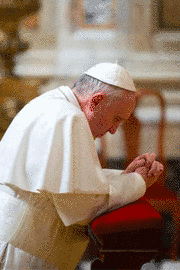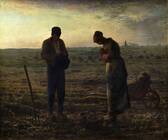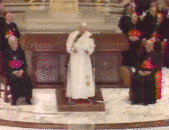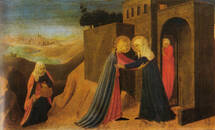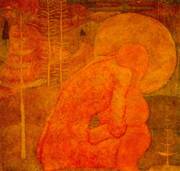Pray, Pregate, Oren, Molite, Priez, Betet ....
'Please join me in praying for Syria, so that constructive dialogue will replace the horrendous violence.' Papa Benedict XVI - @Pontifex tweet 7 Jan 2013
Pope Francis's Prayer Intentions
for December 2020
We pray that our personal relationship with Jesus Christ be nourished by the Word of God and a life of prayer.
Some of the feast days this month:
1st December - Bl Charles de Foucauld
3rd December - St Francis Xavier
4th December - St Clement of Alexandria & St John Damascene
6th December - 2nd Sunday of Advent
7th December - St Ambrose of Milan
8th December - Solemnity of the Immaculate Conception of Mary
9th December - St Juan Diego Cuauhtlatoatzin
10th December - Our Lady of Loreto
12th December - Our Lady of Guadalupe
14th December - St John of the Cross
21st December - St Peter Canisius
25th December - Solemnity of the Nativity of Our Lord, Christmas Day
26th December - St Stephen (the First Martyr)
27th December - Feast of the Holy Family
(also on this date St John, Apostle & Evangelist)
28th December - Holy Innocents, Martyrs
Man in Prayer (I)  (II)
(II) 
Benedict XVI: "Dear friends, in these examples of prayers from different epochs and civilizations emerges the awareness that the human being has of his condition as a creature and of his dependence on an Other superior to him and source of every good. The man of every age prays because he cannot help but wonder what is the meaning of his existence, which remains obscure and bleak, if it is not put in relation to the mystery of God and of his plan for the world. Human life is an intertwining of good and evil, of undeserved suffering and of joy and beauty, which spontaneously and irresistibly impels us to ask God for that light and inner strength which help us on earth and disclose a hope that goes beyond the confines of death. The pagan religions remain an invocation which, from the earth, awaits a word from Heaven. Proclus of Constantinople, one of the last great pagan philosophers, who lived in an epoch already fully Christian, gives voice to this expectation, saying: “Unknowable, no one contains you. All that which we think belongs to you. Our evil and our good are from you, our every yearning depends on you, O ineffable one, whom our souls feel present, raising to you a hymn of silence” (Hymni)."
At the mo, Totus2us has these prayer podcasts:
the Rosary in English, French, Italian & Spanish
the Stations of the Cross in English, French & Spanish
the Divine Mercy Chaplet (in Arabic, Czech, English, French, German, Greek, Italian, Latin, Polish, Portuguese, Slovak & Spanish)
& Novena (in English, French, Italian, Portuguese & Spanish)
and Novenas - the Divine Mercy Novena & Chaplet - to the Sacred Heart - to the Holy Spirit - to Our Lady - to Mary Immaculate - to St Joseph - to St Padre Pio - to St Thérèse of Lisieux - to St John Paul II - in thanksgiving for the life of JPII; with: JPII's encyclical the Redeemer of Man - JPII's encyclical the Church of the Eucharist - JPII's encyclical the Gospel of Life - JPII's encyclical Faith & Reason - JPII's apostolic exhortation on Europe - BXVI's encyclical God is Love.
Francis's Urbi et Orbi Blessing at an Extraordinary Moment of Prayer
Sagrato of St Peter's Basilica, Friday 27 March 2020, - also in Arabic, Croatian, French, German, Italian, Portuguese & Spanish
"“When evening had come” (Mk 4, 35). The Gospel passage we have just heard begins like this. For weeks now it has been evening. Thick darkness has gathered over our squares, our streets and our cities; it has taken over our lives, filling everything with a deafening silence and a distressing void, that stops everything as it passes by; we feel it in the air, we notice in people’s gestures, their glances give them away. We find ourselves afraid and lost. Like the disciples in the Gospel we were caught off guard by an unexpected, turbulent storm. We have realized that we are on the same boat, all of us fragile and disoriented, but at the same time important and needed, all of us called to row together, each of us in need of comforting the other. On this boat… are all of us. Just like those disciples, who spoke anxiously with one voice, saying “We are perishing” (v. 38), so we too have realized that we cannot go on thinking of ourselves, but only together can we do this.
It is easy to recognize ourselves in this story. What is harder to understand is Jesus’ attitude. While his disciples are quite naturally alarmed and desperate, he stands in the stern, in the part of the boat that sinks first. And what does he do? In spite of the tempest, he sleeps on soundly, trusting in the Father; this is the only time in the Gospels we see Jesus sleeping. When he wakes up, after calming the wind and the waters, he turns to the disciples in a reproaching voice: “Why are you afraid? Have you no faith?” (v. 40).
Let us try to understand. In what does the lack of the disciples’ faith consist, as contrasted with Jesus’ trust? They had not stopped believing in him; in fact, they called on him. But we see how they call on him: “Teacher, do you not care if we perish?” (v. 38). Do you not care: they think that Jesus is not interested in them, does not care about them. One of the things that hurts us and our families most when we hear it said is: “Do you not care about me?” It is a phrase that wounds and unleashes storms in our hearts. It would have shaken Jesus too. Because he, more than anyone, cares about us. Indeed, once they have called on him, he saves his disciples from their discouragement.
The storm exposes our vulnerability and uncovers those false and superfluous certainties around which we have constructed our daily schedules, our projects, our habits and priorities. It shows us how we have allowed to become dull and feeble the very things that nourish, sustain and strengthen our lives and our communities. The tempest lays bare all our prepackaged ideas and forgetfulness of what nourishes our people’s souls; all those attempts that anesthetize us with ways of thinking and acting that supposedly “save” us, but instead prove incapable of putting us in touch with our roots and keeping alive the memory of those who have gone before us. We deprive ourselves of the antibodies we need to confront adversity.
In this storm, the façade of those stereotypes with which we camouflaged our egos, always worrying about our image, has fallen away, uncovering once more that (blessed) common belonging, of which we cannot be deprived: our belonging as brothers and sisters.
“Why are you afraid? Have you no faith?” Lord, your word this evening strikes us and regards us, all of us. In this world, that you love more than we do, we have gone ahead at breakneck speed, feeling powerful and able to do anything. Greedy for profit, we let ourselves get caught up in things, and lured away by haste. We did not stop at your reproach to us, we were not shaken awake by wars or injustice across the world, nor did we listen to the cry of the poor or of our ailing planet. We carried on regardless, thinking we would stay healthy in a world that was sick. Now that we are in a stormy sea, we implore you: “Wake up, Lord!”
“Why are you afraid? Have you no faith?” Lord, you are calling to us, calling us to faith. Which is not so much believing that you exist, but coming to you and trusting in you. This Lent your call reverberates urgently: “Be converted!”, “Return to me with all your heart” (Joel 2, 12). You are calling on us to seize this time of trial as a time of choosing. It is not the time of your judgement, but of our judgement: a time to choose what matters and what passes away, a time to separate what is necessary from what is not. It is a time to get our lives back on track with regard to you, Lord, and to others. We can look to so many exemplary companions for the journey, who, even though fearful, have reacted by giving their lives. This is the force of the Spirit poured out and fashioned in courageous and generous self-denial. It is the life in the Spirit that can redeem, value and demonstrate how our lives are woven together and sustained by ordinary people – often forgotten people – who do not appear in newspaper and magazine headlines nor on the grand catwalks of the latest show, but who without any doubt are in these very days writing the decisive events of our time: doctors, nurses, supermarket employees, cleaners, caregivers, providers of transport, law and order forces, volunteers, priests, religious men and women and so very many others who have understood that no one reaches salvation by themselves. In the face of so much suffering, where the authentic development of our peoples is assessed, we experience the priestly prayer of Jesus: “That they may all be one” (Jn 17, 21). How many people every day are exercising patience and offering hope, taking care to sow not panic but a shared responsibility. How many fathers, mothers, grandparents and teachers are showing our children, in small everyday gestures, how to face up to and navigate a crisis by adjusting their routines, lifting their gaze and fostering prayer. How many are praying, offering and interceding for the good of all. Prayer and quiet service: these are our victorious weapons.
“Why are you afraid? Have you no faith?" Faith begins when we realise we are in need of salvation. We are not self-sufficient; by ourselves we founder: we need the Lord, like ancient navigators needed the stars. Let us invite Jesus into the boats of our lives. Let us hand over our fears to him so that he can conquer them. Like the disciples, we will experience that with him on board there will be no shipwreck. Because this is God’s strength: turning to the good everything that happens to us, even the bad things. He brings serenity into our storms, because with God life never dies.
The Lord asks us and, in the midst of our tempest, invites us to reawaken and put into practice that solidarity and hope capable of giving strength, support and meaning to these hours when everything seems to be floundering. The Lord awakens so as to reawaken and revive our Easter faith. We have an anchor: by his cross we have been saved. We have a rudder: by his cross we have been redeemed. We have a hope: by his cross we have been healed and embraced so that nothing and no one can separate us from his redeeming love. In the midst of isolation when we are suffering from a lack of tenderness and chances to meet up, and we experience the loss of so many things, let us once again listen to the proclamation that saves us: he is risen and is living by our side. The Lord asks us from his cross to rediscover the life that awaits us, to look towards those who look to us, to strengthen, recognize and foster the grace that lives within us. Let us not quench the wavering flame (cf Is 42, 3) that never falters, and let us allow hope to be rekindled.
Embracing his cross means finding the courage to embrace all the hardships of the present time, abandoning for a moment our eagerness for power and possessions in order to make room for the creativity that only the Spirit is capable of inspiring. It means finding the courage to create spaces where everyone can recognize that they are called, and to allow new forms of hospitality, fraternity and solidarity. By his cross we have been saved in order to embrace hope and let it strengthen and sustain all measures and all possible avenues for helping us protect ourselves and others. Embracing the Lord in order to embrace hope: that is the strength of faith, which frees us from fear and gives us hope.
“Why are you afraid? Have you no faith?" Dear brothers and sisters, from this place that tells of Peter’s rock-solid faith, I would like this evening to entrust all of you to the Lord, through the intercession of Mary, Health of the People and Star of the stormy sea. From this colonnade that embraces Rome and the whole world, may God’s blessing come down upon you as a consoling embrace. Lord, may you bless the world, give health to our bodies and comfort our hearts. You ask us not to be afraid. Yet our faith is weak and we are fearful. But you, Lord, will not leave us at the mercy of the storm. Tell us again: “Do not be afraid” (Mt 28, 5). And we, together with Peter, “cast all our anxieties onto you, for you care about us” (cf 1 Pet 5, 7)."
Papa St JPII's address in Miami on Prayer 
Cathedral of Saint Mary, Thursday 10 September 1987
"The 'Our Father' teaches us that our relationship to God is one of dependence. We are his adopted sons and daughters through Christ. All that we are and all that we have comes from him and is destined to return to him. The 'Our Father' also presents prayer to us as an expression of our desires. Beset as we are by human weakness, we naturally ask God for many things. Many times we may be tempted to think that He does not hear or answer us. But as St Augustine wisely reminds us, God already knows what we desire even before we ask. He says that prayer is for our benefit, because in praying we "exercise" our desires so that we will grasp what God is preparing to give us. It is an opportunity for us to "widen our hearts".
In other words, God is always listening to us and answering us – but from the perspective of a love far greater and a knowledge far deeper than our own. When it appears that He is not fulfilling our desires by granting the things we ask, however unselfish and noble they may be, in reality He is purifying those desires of ours for the sake of a higher good that often surpasses our understanding in this life. The challenge is to "widen our hearts" by hallowing His name, by seeking His Kingdom, and by accepting His will. Like Christ in the Garden of Gethsemane we may sometimes pray either for ourselves or others, "Father, you have the power to do all things. Take this cup away!" But also like Christ we must add, "Not my will but your will be done"."
Catechesis with BXVI on the Magnificat 
BXVI: "The first movement of the Marian canticle (cf Lk 1, 46-50) is a sort of solo voice that rises to heaven to reach the Lord. We hear the voice of Our Lady herself who speaks thus of her Saviour, who has done great things in her soul and in her body. In fact, note the constant resonance of the first person: "My soul... my spirit... my Saviour... they will call me blessed... great things have been done in me... ". The soul of the prayer is, thus, the celebration of divine grace which has made an irruption in the heart and in the existence of Mary, rendering her the Mother of the Lord.
The intimate structure of her praying song is, therefore, praise, thanksgiving, grateful joy. But this personal witness is not solitary and intimate, purely individualistic, because the Virgin Mother is conscious of having a mission to accomplish for humanity and her story is inserted within the history of salvation. And thus she can say: "His mercy extends from generation to generation over those who fear him" (v 50). With this praise of the Lord, Our Lady gives voice to all the redeemed creatures who in her "fiat", and thus in the figure of Jesus born of the Virgin, find the mercy of God. .."
Catechesis with St John Paul II on Prayer 
"When Christ, responding to the disciples' request "Teach us to pray" pronounces the words of his prayer, he teaches not only the words, but teaches that in our colloquy with the Father there must be total sincerity and full openness. Prayer must embrace everything that is part of our life. It cannot be something supplementary or marginal. Everything must find in it its own voice. Even everything that aggravates us; that we are ashamed of; that by its nature separates us from God. Precisely this above all. It is prayer that always, first and essentially, demolishes the barrier between us and God, which sin and evil can have put up.
Through prayer all the world must find its right reference: that is, its reference to God: my interior world and also the objective world, the one in which we live, and thus as we know it. If we convert to God, everything in us is turned towards him. Prayer is the expression of such a turning towards God; and it is, at the same time, our continual conversion: our life. Holy Scripture says: "For as the rain and the snow come down from heaven and do not return on high without having irrigated the earth, without having made it fruitful and sprout so as to give seed to the sower and bread to the eater thus shall it be of the word that comes from my mouth: it shall not return to me without effect, without having performed that which I desire and without having accomplished that for which I sent it" (Is 55, 10-11).
Prayer is the way of the Verb who embraces everything. The way of the eternal Verb who traverses the depth of so many hearts; who leads back to the Father all that which in Him has its origin.
Prayer is the sacrifice of our lips (cf Heb 13, 15). It is, as St Ignatius of Antioch writes, "Living water that murmurs within us and says: come to the Father."
Pope Benedict XVI's Catechesis on Prayer & the Saints
Castel Gandolfo, Wednesday 13 August 2008d, - also in Croatian, French, German, Italian, Portuguese & Spanish
"Dear brothers and sisters,
Having returned from Bressanone, where I was able to spend a restful period, I am happy to meet with you and greet you, dear inhabitants of Castel Gandolfo, and you, pilgrims, who have come here today to visit me. I would like once again to thank all those who welcomed me and watched over/looked after me during my stay in the mountains. They were days of serene relaxation, during which I did not cease remember to/remind the Lord all those who entrust themselves to my prayer. And there are truly so many who write to me asking me to pray for them are truly numerous. They show/manifest/tell me of their joys, but also their worries, their life projects but also (their) family and work problems, the expectations and hopes that they carry in their hearts, together with the anxieties connected with the uncertainties that humanity is living in this moment/at this time. I can assure you/them that for each and every one I have a memory/I remember each & every one, especially in the daily celebration of Holy Mass and in the recitation of the Rosary. I know well that the first/principal service that I can render to the Church and to humanity is precisely that of prayer, for in praying I place with trust in the Lord's hands the ministry that He himself has entrusted to me, together with the fate/fortunes of the entire ecclesial and civil community.
Those who pray never lose hope, even when they find themselves in a difficult and even humanly hopeless plight. Sacred Scripture teaches us this and Church history bears witness to this. In fact, how many examples we could cite of situations in which it was precisely prayer that sustained the journey of Saints and of the Christian people! Among the testimonies of our epoch I would like to mention the examples of two Saints whom we are commemorating in these days: Teresa Benedicta of the Cross, Edith Stein, whose feast we celebrated on 9 August, and Maximilian Mary Kolbe, whom we will commemorate tomorrow, on 14 August, the eve of the Solemnity of the Assumption of the Blessed Virgin Mary. Both ended their earthly life with martyrdom in the concentration camp of Auschwitz. Their lives might seem to have been a defeat, but it is precisely in their martyrdom that the brightness of Love which dispels the gloom of selfishness and hatred shines forth. The following words are attributed to St Maximilian Kolbe, who is said to have spoken them when the Nazi persecution was raging: "Hatred is not a creative force: only love is creative". And heroic proof of his love was the generous offering he made of himself in exchange for a fellow prisoner, an offer that culminated in his death in the starvation bunker on 14 August 1941.
On 6 August the following year, three days before her tragic end, Edith Stein approaching some Sisters in the monastery of Echt, in the Netherlands, said to them: "I am ready for anything. Jesus is also here in our midst. Thus far I have been able to pray very well and I have said with all my heart: "Ave, Crux, spes unica'". Witnesses who managed to escape the terrible massacre recounted that while Teresa Benedicta of the Cross, dressed in the Carmelite habit, was making her way, consciously, toward death, she distinguished herself by her conduct full of peace, her serene attitude and her calm behaviour, attentive to the needs of all. Prayer was the secret of this Saint, Co-Patroness of Europe, who, "Even after she found the truth in the peace of the contemplative life, she was to live to the full the mystery of the Cross" (Apostolic Letter Spes Aedificandi).
"Hail Mary!" was the last prayer on the lips of St Maximilian Mary Kolbe, as he offered his arm to the person who was about to kill him with an injection of phenolic acid. It is moving to note how humble and trusting recourse to Our Lady is always a source of courage and serenity. While we prepare to celebrate the Solemnity of the Assumption, which is one of the best-loved Marian feasts in the Christian tradition, let us renew our entrustment to her who from Heaven watches over us with motherly love at every moment. In fact, we say this in the familiar prayer of the Hail Mary, asking her to pray for us "now and at the hour of our death"."
(Published on 16 October 2012)
Pope Francis @Pontifex :
Come, Holy Spirit! Help us to overcome our selfishness. (20.05.14)
The one who listens attentively to the Word of God and truly prays, always asks the Lord: what is your will for me? (19.05.14)
The month of May, dedicated to Mary, is a fitting time to begin to recite the rosary daily. (17.05.14)
Let us ask the Holy Spirit for the grace to live daily according to the mind of Jesus and his Gospel. (15.05.14)
Let us read the Gospel, a small section each day. This way we will learn what is most essential in our lives: love and mercy. (13.05.14)
Our life has been saved by the blood of Christ. Let us always be renewed by this love. (12.05.14)
7 September 2013 - Day of Prayer and Fasting for Peace in Syria,
the Middle East & throughout the whole world
Requested by Pope Francis for the Vigil of the Feast of the Birth of Mary, Queen of Peace:
"Dear Brothers and Sisters, Hello!
Today, dear brothers and sisters, I wish to make add my voice to the cry which rises up with increasing anguish from every part of the world, from every people, from the heart of each person, from the one great family which is humanity: it is the cry for peace! It is a cry which declares with force: we want a peaceful world, we want to be men and women of peace, and we want in our society, torn apart by divisions and conflict, that peace break out! War never again! Never again war! Peace is a precious gift, which must be promoted and protected.
There are so many conflicts in this world which cause me great suffering and worry, but in these days my heart is deeply wounded in particular by what is happening in Syria and anguished by the dramatic developments which are looming.
I appeal strongly for peace, an appeal which arises from the deep within me. How much suffering, how much devastation, how much pain has the use of arms carried in its wake in that martyred country, especially among civilians and the unarmed! I think of many children will not see the light of the future! With utmost firmness I condemn the use of chemical weapons: I tell you that those terrible images from recent days are burned into my mind and heart. There is a judgment of God and of history upon our actions which are inescapable! Never has the use of violence brought peace in its wake. War begets war, violence begets violence.
With all my strength, I ask each party in this conflict to listen to the voice of their own conscience, not to close themselves in solely on their own interests, but rather to look at each other as brothers and decisively and courageously to follow the path of encounter and negotiation, and so overcome blind conflict. With similar vigour I exhort the international community to make every effort to promote clear proposals for peace in that country without further delay, a peace based on dialogue and negotiation, for the good of the entire Syrian people.
May no effort be spared in guaranteeing humanitarian assistance to those wounded by this terrible conflict, in particular those forced to flee and the many refugees in nearby countries. May humanitarian workers, charged with the task of alleviating the sufferings of these people, be granted access so as to provide the necessary aid.
What can we do to make peace in the world? As Pope John said, it pertains to each individual to establish new relationships in human society under the mastery and guidance of justice and love (cf. John XXIII, Pacem in Terris, [11 April 1963]: AAS 55, [1963], 301-302).
All men and women of good will are bound by the task of pursuing peace. I make a forceful and urgent call to the entire Catholic Church, and also to every Christian of other confessions, as well as to followers of every religion and to those brothers and sisters who do not believe: peace is a good which overcomes every barrier, because it belongs all of humanity!
I repeat forcefully: it is neither a culture of confrontation nor a culture of conflict which builds harmony within and between peoples, but rather a culture of encounter and a culture of dialogue; this is the only way to peace.
May the plea for peace rise up and touch the heart of everyone so that they may lay down their weapons and be let themselves be led by the desire for peace.
To this end, brothers and sisters, I have decided to proclaim for the whole Church on 7 September next, the vigil of the birth of Mary, Queen of Peace, a day of fasting and prayer for peace in Syria, the Middle East, and throughout the world, and I also invite each person, including our fellow Christians, followers of other religions and all men of good will, to participate, in whatever way they can, in this initiative.
On 7 September, in Saint Peter’s Square, here, from 19:00 until 24:00, we will gather in prayer and in a spirit of penance, invoking God’s great gift of peace upon the beloved nation of Syria and upon each situation of conflict and violence around the world. Humanity needs to see these gestures of peace and to hear words of hope and peace! I ask all the local churches, in addition to fasting, that they gather to pray for this intention.
Let us ask Mary to help us to respond to violence, to conflict and to war, with the power of dialogue, reconciliation and love. She is our mother: may she help us to find peace; all of us are her children! Help us, Mary, to overcome this most difficult moment and to dedicate ourselves each day to building in every situation an authentic culture of encounter and peace. Mary, Queen of Peace, pray for us!" - Pope Francis at the Angelus, Sunday 1 September 2013
Prayer of Pope John Paul I: "Lord, take me as I am, with my defects, with my shortcomings, but make me become as you want me to be."
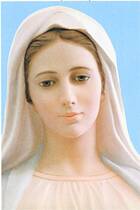
Our Lady's message to Mirjana Soldo, Medjugorje, 2nd August 2014:
"Dear children, the reason that I am with you, my mission, is to help you for ‘good’ to win, even though this does not seem possible to you now. I know that you do not understand many things as I also did not understand everything, everything that my Son explained to me while he was growing up alongside me – but I believed him and followed him. I ask this of you also, to believe me and to follow me. However, my children, to follow me means to love my Son above everything, to love him in every person without making differences. For you to be able to do this, I call you anew to renunciation, prayer and fasting. I am calling you for the Eucharist to be the life of your soul. I am calling you to be my apostles of light who will spread love and mercy through the world. My children, your life is only a blink in contrast to eternal life. And when you come before my Son, in your hearts he will see how much love you had. In order to spread love in the right way, I am asking my Son, through love, to grant you unity through him, unity among you, unity between you and your shepherds. Through them my Son always gives himself to you anew and renews your soul. Do not forget this. Thank you"
....
Prayer of Blessed John XXIII
at the opening of the Second Vatican Ecumenical Council:
"We stand before you, Holy Spirit, conscious of our sinfulness,
but aware that we gather in your name.
Come to us, remain in us, and enlighten our hearts.
Give us light and strength to know your will,
to make it our own, and to live it in our lives.
Guide us by your wisdom, support us by your power,
for you are God, sharing the glory of Father and Son.
You desire justice for all: enable us to uphold the rights of others;
Do not allow us to be misled by ignorance
or corrupted by fear or favour.
Unite us to yourself in the bond of love
and keep us faithful to all that is true.
As we gather in your name, may we temper justice with love,
so that all our decisions may be pleasing to you,
and earn the reward promised to good and faithful servants.
You live and reign with the Father and the Son,
one God, forever and ever. Amen."
.....
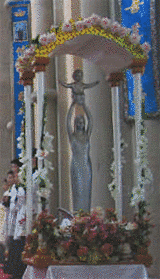
Papa Benedict has particularly asked us all to pray for China:
Prayer to Our Lady of Sheshan
Virgin Most Holy, Mother of the Incarnate Word and our Mother,
venerated in the Shrine of Sheshan under the title
Help of Christians,
the entire Church in China looks to you with devout affection.
We come before you today to implore your protection.
Look upon the People of God and, with a mother’s care, guide them
along the paths of truth and love, so that they may always be
a leaven of harmonious coexistence among all citizens.
When you obediently said "yes" in the house of Nazareth,
you allowed God’s eternal Son to take flesh in your virginal womb
and thus to begin in history the work of our redemption.
You willingly and generously cooperated in that work,
allowing the sword of pain to pierce your soul,
until the supreme hour of the Cross, when you kept watch on Calvary,
standing beside your Son, who died that we might live.
From that moment, you became, in a new way,
the Mother of all those who receive your Son Jesus in faith
and choose to follow in his footsteps by taking up his Cross.
Mother of hope, in the darkness of Holy Saturday you journeyed
with unfailing trust towards the dawn of Easter.
Grant that your children may discern at all times,
even those that are darkest, the signs of God’s loving presence.
Our Lady of Sheshan, sustain all those in China,
who, amid their daily trials, continue to believe, to hope, to love.
May they never be afraid to speak of Jesus to the world,
and of the world to Jesus.
In the statue overlooking the Shrine you lift your Son on high,
offering him to the world with open arms in a gesture of love.
Help Catholics always to be credible witnesses to this love,
ever clinging to the rock of Peter on which the Church is built.
Mother of China and all Asia, pray for us, now and for ever. Amen!
.....
